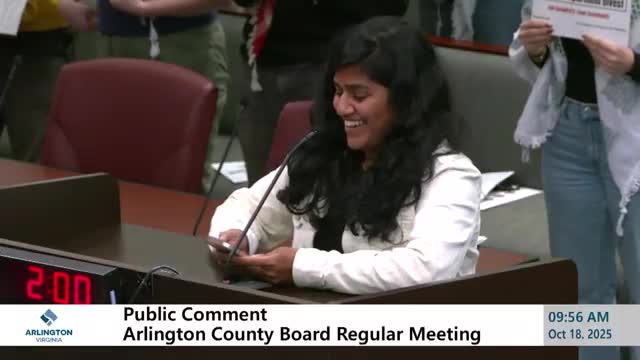Residents Call on Arlington To Divest From Firms Linked to Israeli Military; Board Says Foreign Policy Falls Outside Local Authority
Get AI-powered insights, summaries, and transcripts
Subscribe
Summary
Several public speakers urged Arlington to adopt an ethics policy and to divest county-supported economic development partnerships from companies tied to Israel's defense sector. The board said foreign policy was beyond its jurisdiction but acknowledged interest in reviewing county ethics policies and economic development practices.
Multiple residents used the public-comment period to urge the Arlington County Board to adopt an ethics policy and to end county collaboration with firms and advisory bodies they said are complicit in human-rights abuses abroad.
Kishore Mahulikar, representing Arlington Apartheid Divest, asked the board to adopt a public ethics policy that would "explicitly end any and all Arlington collaboration with and support for entities complicit in apartheid, genocide, systemic racism, and human rights abuses," and to restructure the county's economic development model away from defense, surveillance and aerospace firms.
Other speakers repeated related demands and said local economic-development incentives and partnerships — including ties to the Virginia Israel Advisory Board — make Arlington complicit. Speakers linked those partnerships to higher rents and displacement locally and urged divestment and reinvestment in community services.
Chair Takis Carantonis and County Manager Mark Schwartz responded that decisions on U.S. foreign policy are outside the county’s authority and that the board’s role is to keep the community united and free of hate. Carantonis said the county has internal ethics policies and an administrative guideline under review; several board members said an update of the decades-old ethics policy is timely.
Carantonis said the county's ethics conversation focuses on conduct and transparency rather than the political positions advocated by speakers. He said the board is open to continued dialogue in other venues and that any formal changes to procurement or economic development policy would follow appropriate administrative and legal review.
No divestment action or ordinance change was proposed or adopted at the meeting. Speakers asked for a transparent process for labor and community input into Arlington Economic Development (AED) decision-making; the board noted it will discuss related governance and ethics matters at future meetings.
